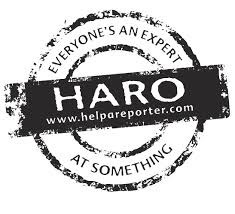
What is HARO?
The acronym stands for Help a Reporter Out. It’s comparable to a dating website that connects journalists with people like you who want to be featured on major media sites. HARO has an extensive network of more than 55,000 bloggers and journalists connecting with over 800,000 sources.

For those of you who are ready to take your link building strategy to the next level, I’ll explain everything you need to know about leveraging HARO for brand exposure.
How HARO works

For those of you who aren’t familiar with HARO, the platform is very straightforward.
Journalists need sources for their news stories. So they join HARO to put in requests about certain topics. The requests include a brief summary of the story, source qualifications, and a pitch deadline.
When you join HARO as a source, you’ll receive three emails each day, Monday – Friday.
- 5:35 AM EST
- 12:35 PM EST
- 5:35 PM EST
It’s up to the sources to monitor these emails for topic requests that align with their own qualifications. If a source sees something that they qualify for and are interested in helping out with, they can reply to the email with a pitch.
Once a pitch is accepted, the source will be connected with the journalist writing the story to provide insight for the article. As a result, sources get mentioned along with links to their website.
HARO Plans & Pricing

Basic
The Basic plan is HARO’s free plan that comes with standard features, including three emails with requests from journalists per day and support via email. Though features are limited, it includes everything an individual needs to successfully receive requests and submit responses.
It’s best for businesses that are new to HARO and want to become familiar with it before committing to paying for the premium version that gives users added features. It’s also good for businesses that are just starting to build brand awareness and backlinks, and are therefore using HARO infrequently.
Standard
The Standard plan costs $19 per month and includes everything from the Basic plan plus keyword alerts and one profile. The keyword alerts allow users to get notifications based on certain keywords, enabling them to more easily and quickly identify requests that best suit them and their business. Additionally, it includes the ability to create profiles, which allow users to save their contact information on HARO and eliminate the need to re-write it for each submission.
The Standard plan is best for businesses that more frequently use HARO given the added features that save users a lot of time, such as the ability to get keyword alters so businesses only see requests that fit their business, and the ability to save their contact information. However, it best serves businesses that are really focused on one topic area, given the limited keyword alerts.
Advanced
The Advanced plan costs $49 per month and includes everything from the Standard plan with the addition of more keywords, profiles, and a head start, or the ability to see requests before other users. It includes up to three keyword alerts for more request targeting and up to three profiles, allowing multiple employees within the same company to respond to different quote requests.
The Advanced plan is best for businesses with a marketing or public relations (PR) team that works to provide quotes from a few different sources from within their company. This is because it includes multiple keyword alerts—allowing businesses to see requests across different topics—and three different source profiles.
Premium
The Premium plan costs $149 per month. It includes everything from the Advanced plan, but with the difference of including unlimited keywords and user profiles, as well as premium support that’s available by phone and email.
Given its unlimited offerings, it’s best suited for large companies with a PR department working to get press on behalf of dozens of employees across different departments. The inclusion of unlimited keywords and profiles makes it ideal for companies with many different product or service areas, which can each be represented by its own expert source.
HAROs & Select Requests to Respond To
After completing your account setup, HARO will send you an email with a list of journalist requests three times per day. These consist of a series of linked quote requests; look for requests that match your area of expertise. Note, however, that requests will include information on source requirements, which may include a specific job title or certain experience. If your experience and credentials fit, click on the relevant link to respond.
Help A Reporter Out service connects public relations people with journalists who are looking to have certain stories covered in the Press.
It is a method that allows for two parties to rapidly find each other and complete work in a mutually beneficial way.
Here's exactly how it works.
Publishers: Publishers are typically looking for opportunities to put their clients in the news.
In the early days of public relations, PR people would rest on relationships with journalist for placing stories containing their clients’ business name.
The PR person would use this relationship repeatedly as they were seeking to get their clients in the news.
Clients very much want to be in the news because it helps their brand awareness.
In addition to awareness, Brands want to be represented in the news in a positive way.
In this fashion, PR people would often help with reputation management before the internet.
Conclusion
HARO is a great way to build high-quality backlinks.
Using a network like this is much easier and more effective than pitching yourself directly to individual news sites and publications.
Instead, just wait for a reporter to submit a relevant request to your niche. Then follow up with your pitch through this platform.
This is your best chance to get featured on major authority sites that will grow your brand exposure and drive more traffic to your website with links.


